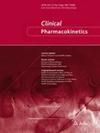Tenofovir disoproxil fumarate: clinical pharmacology and pharmacokinetics.
Abstract
Tenofovir disoproxil fumarate (tenofovir DF) is an oral prodrug of tenofovir, a nucleotide (nucleoside monophosphate) analogue with activity against retroviruses, including HIV-1, HIV-2 and hepadnaviruses. Following absorption, tenofovir DF is rapidly converted to tenofovir, which is metabolised intracellularly to its active anabolite tenofovir diphosphate, which is a competitive inhibitor of HIV-1 reverse transcriptase and terminates the growing DNA chain. Tenofovir exerts antiviral effects in a variety of cell types, including resting cells. Tenofovir exhibits longer serum (17 hours) and intracellular (> or =60 hours) half-lives than those of nucleoside analogues, which supports a flexible once-daily administration schedule. The pharmacokinetics of tenofovir are dose-proportional and similar in healthy volunteers and HIV-infected individuals. The oral bioavailability of tenofovir is enhanced by administration with a high-fat meal, but is similar at steady state when administered with or without a typical meal. Tenofovir is not a substrate, inducer or inhibitor of human cytochrome P450 enzymes in vitro or in vivo. Tenofovir DF has been studied with 15 other antiretroviral and other concomitant medications frequently used in the HIV-1-infected population. With the exception of didanosine and atazanavir, which require dosage modifications, no clinically significant drug interactions have been observed with tenofovir DF. The recommended oral dosage of tenofovir DF in adults is 300 mg/day. Tenofovir is eliminated by renal elimination, including tubular secretion; dose-interval adjustments are necessary for tenofovir DF in patients with significant renal impairment. No dosage adjustment of tenofovir DF is necessary in patients with liver disease.





